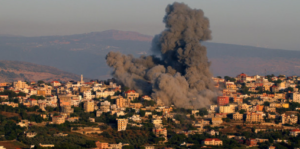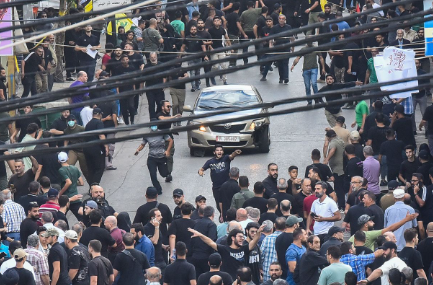Lebanon is reeling from a series of catastrophic explosions that have left the nation in a state of panic and uncertainty. The recent detonation of hundreds of handheld pagers and walkie-talkies, reportedly linked to the militant group Hezbollah, has resulted in at least 37 deaths and over 3,000 injuries. These unprecedented attacks have been attributed to Israel, though it has not officially claimed responsibility.
A Nation Scarred and On Edge
The explosions have thrust Lebanon back into a state of turmoil, reminiscent of the traumatic 2020 Beirut port blast. The devastating explosion of ammonium nitrate at the port had already shattered the nation, killing over 200 people and injuring thousands more. Now, the latest blasts have reignited those fears, leaving many Lebanese grappling with renewed psychological scars.
Lebanon has been enduring a relentless economic collapse, political paralysis, and social unrest. The country has been without a functioning government or president for over two years, and poverty rates continue to climb. Amid this turmoil, the healthcare system, already stretched thin, is struggling to cope with the influx of casualties.
Escalating Conflict with Israel
The explosions have also escalated tensions between Israel and Hezbollah, with both sides trading fire across the border. Hezbollah’s leader, Hassan Nasrallah, has vowed retaliation, accusing Israel of war crimes and a declaration of war. Israel has stepped up its warnings, signaling the potential for a larger military operation against Hezbollah.
This comes at a time when the region is already volatile, with Israel engaged in a fierce conflict in Gaza. The possibility of a broader war looms large, threatening to plunge Lebanon into deeper chaos and conflict.
International Calls for Restraint
Global leaders have expressed deep concern over the escalating violence. U.S. Secretary of State Antony Blinken has urged restraint, while UK Foreign Secretary David Lammy has called for an immediate ceasefire between Israel and Hezbollah. The international community is closely monitoring the situation, aware that further escalation could have devastating consequences for Lebanon and the wider region.
Fear and Uncertainty Grip the Nation
In the aftermath of the explosions, fear and paranoia have taken hold of the population. Parents are keeping their children away from schools, and people are avoiding using electronic devices. The Lebanese civil defense has advised citizens to switch off and remove batteries from all devices until further notice, reflecting the widespread anxiety and confusion.
Lebanon’s civil aviation authorities have banned the transport of pagers and walkie-talkies on flights departing from Beirut’s Rafik Hariri International Airport, further illustrating the extent of the crisis.

A Nation’s Enduring Resilience
Despite the overwhelming challenges, the resilience of the Lebanese people shines through. Many expatriates, who provide crucial financial support to their families back home, continue to return, maintaining a lifeline for the struggling nation.
Yet, as the nation grapples with this latest crisis, the question remains: how many more disasters can Lebanon endure before reaching a breaking point?
The recent explosions of pagers in Lebanon have caused a major crisis, killing 37 people and injuring over 3,000 across the country. The devices were primarily used by Hezbollah, a group that avoids smartphones to evade Israeli electronic surveillance. The attack is believed to have been a highly sophisticated operation, likely carried out by Israel, though it has not been confirmed. The pagers, some of which were manufactured by a Taiwanese company and sold through a Hungarian intermediary, were possibly sabotaged before being distributed to Hezbollah members.
Experts suggest that small explosive devices were hidden within the pagers, which were then remotely triggered. This would have required extensive planning, intelligence gathering, and infiltration into the supply chain, indicating the involvement of a state actor. The blasts have intensified fears in Lebanon, already on edge due to escalating conflicts with Israel and the ongoing war in Gaza. The attacks have also raised concerns about the security of Hezbollah’s communication methods, forcing the group to reassess their strategies.
The explosions have worsened the already volatile situation in Lebanon, causing many residents to fear for their safety and leading to a ban on carrying pagers and walkie-talkies on flights from Beirut. International airlines like Lufthansa and Air France have suspended flights to Lebanon, Tel Aviv, and Tehran amid the heightened tensions. The incident underscores the complex and dangerous dynamics in the region, as both Hezbollah and Israel brace for potential further escalations.
